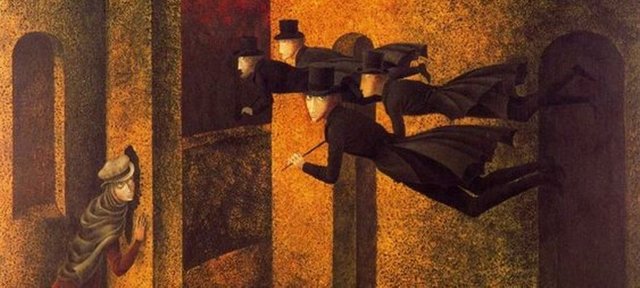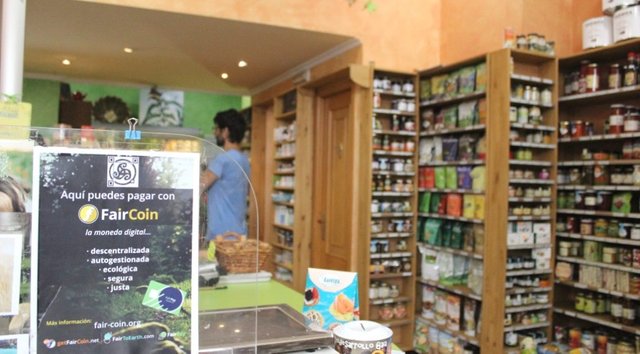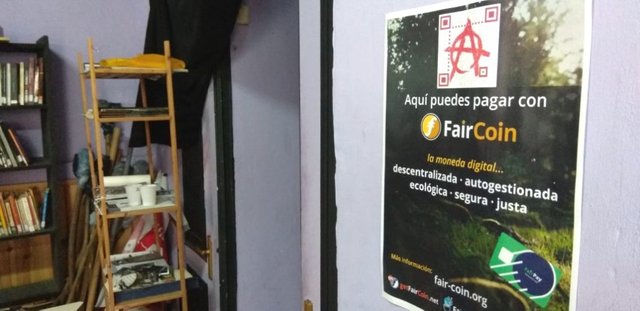Currency, land and post-capitalist social justice
"It is well enough that people of the nation do not understand our banking and monetary system, for if they did, I believe there would be a revolution before morning"
Henry Ford
In Galiza (Spain) alone, more than a hundred families base a good part of their economy on a decentralized electronic currency called FairCoin
In 2008 Bitcoin uncovered the box of thunders. Suddenly, the creation of currency ceased to be an exclusive privilege of governments and central banks. Virtually any person or community of people can create and use their own money safely and effectively.
FairCoin is one of those currencies that are basically a binary code, something that is not so different from the Euro or the Dollar since most of the currencies are not even paper or metal. FairCoin is an electronic currency derived from the Bitcoin code but with special characteristics that have made it the chosen one by the people who are part of the FairCoop project, "Earth's Cooperative ecosystem for a fair economy".
FairCoin is obtained like any other currency, accepting it in exchange for goods or services but also exchanging it for other currencies. Like all electronic currencies based on Blockchain technology, it is secure, unforgeable and easy to use by anyone familiar with a smartphone. Given its decentralized nature (no central entity controls it) it favors privacy and is as unblockable as it is unseizable. Every person who uses it is their own bank and nobody else can have control over their money.
WHAT IS THE DIFFERENCE BETWEEN BITCOIN AND FAIRCOIN
Technically in several essential aspects. While Bitcoin requires a large amount of electric power to maintain its network, FairCoin is one of the most ecological electronic currencies that exist. The computer network distributed around the world that secures its transactions only requires a very low power supply. In fact, many of those machines are simply a Raspberry Pi, a simple electronic board that works with only 5 volts.
Transactions in FairCoin, unlike Bitcoin, are practically free and take effect immediately regardless of the distance between the person who pays and the person who receives the money. But, above all, and although it is a completely free currency, there is a large activist community around the world that uses it as a tool to try to build a more fair economic system. Bitcoin is basically a speculative product.
ORIGINS OF FAIRCOOP
FairCoop is an informal cooperative that was born from a mediatic action by the anti-capitalist activist Enric Durán (Vilanova i la Geltrú, Barcelona, 1976). On September 17, 2008 Enric Durán announced through a self-published magazine called Crisi (PDF, catalan version) that using a false payroll and a fictitious work, as well as two ghost companies, had obtained loans from several financial institutions up to a total € 492,000. He declared that he would not return the money and that he would invest it or give it to finance various initiatives -one of them, the publication of the publication.
«I stole 492 thousand euros from those who steal us the most to denounce them and build society's alternatives»

Detail of Bankers in Action of Remedios Varo - 1962
Part of their interest was to denounce how money is created, based on the credits granted. Money is debt and, therefore, the basis of the idea of "infinite growth" that underpins capitalist ideology as well as a "clean" stratagem by which those who control capital also control the resources and labor power of nations. .
With this money, various self-managed cooperative projects were financed and the seed of FairCoop was created. FairCoin was an existing electronic currency and its characteristics made it optimal to serve as a monetary tool for the project, so Enric Durán set out to buy as much as possible of the circulating coins. Most of these acquired currencies remain in a community-managed account, another part is used as currency between people who participate in the project all over the world and the rest (approximately 15%) moves in speculative markets of cryptocurrencies , outside the FairCoop ecosystem.
From these beginnings the movement has not ceased to develop throughout the world to reach Galiza in 2017 where, in just a few months there are at least 45 shops and services that accept FairCoin and more and more people creating cooperative circular economy that, because FairCoin is accepted globally, they can also establish relationships with other local economies that are closer or more distant.
One of the strengths of FairCoop is that it commits to change the FairCoin of the sales of the shops or services accepted by the community to Euros (or other local currency) in case they need it. In this way FairCoop wants to facilitate the transition towards a fairer economic system whose ideal objective is to get out of the capitalist orbit, the idea of infinite growth and the unsustainable negative environmental impact that derives from it.
NOT EVERYTHING IS SO SIMPLE
The movement faces two important challenges:
A stable value with the commitment never to lower it once established. Currently 1 FAIR = 1.2 EURO. In a world where the economy is constantly experiencing ups and downs like a roller coaster, it does not seem easy to understand. Maybe because we are assuming that everything in life is the product of speculative markets. A key point is that FairCoin is a finite currency of which 53 million units exist and will exist forever (divisible up to one hundred millionth part each). It will never be issued anymore and that is why it is deflationary, compared to those that are created indefinitely like the Euro. The more people use it, the more value it will have. The wide margin of growth of the FairCoin economy supports the idea of an increasing value against the currencies created by the States and makes it possible for this to be so until a theoretical maximum is reached in the expansion of the real economy of its system; something that is still very far.
Develop tools that, with greater or lesser accuracy, inject liquidity into Euros and other currencies. Precisely, the commitment to change to Euros the amount sold in FairCoin if the merchants admitted to the ecosystem need it is one of the reasons that raise doubts about the viability of the project. This requires FairCoop to maintain an important liquidity in Euros, precisely the currency that tries to transcend. It is a challenge that, until now, has been known to overcome. But, on the other hand, FairCoop risks its prestige as an anti-capitalist movement when it makes use of certain capitalist tricks such as the development of strategies in speculative cryptocurrency markets, the attraction of investors who venture themselves into a cooperative world and many others. Local Nodes, the decentralized and autonomous structural base of FairCoop, also begin to develop their own resources. All this, for the moment, is resulting in that liquidity, the basis of its social commitment to support the transition to a post-capitalist economy, has remained more or less intact, although this will always be a weak point.
Nobody said it was easy. Fortunately, collective intelligence in action is getting bigger. The capacity for organization and decision-making of a horizontal and self-managed global movement also means constantly devising new forms of communication and consensus. After all, never in history had something like this been done, at such a huge level. Perhaps, the most similar feat is the Irmandiña Revolts in Galiza when several thousand people were able to organize themselves to demolish dozens of castles. Now FairCoop aims, at another level, to remove stones from the capitalist castle to virtually tear down its structures or, at least, facilitate an exit for as many people want to experience a more fair and supportive economy.
WHAT SUPPORTS FAIRCOIN?
An interesting question is: what supports the value of a currency? The answer, today, is simple: nothing more than the confidence of those who use it. We have long left behind the coins backed by tangible products. The gold standard, for example, is history. The Euro is based on the confidence that countries and people will be able to pay, at least, the interest on the credits granted. Therefore, this confidence requires a constant increase in GDP of all the countries that make up the euro zone. Translated into more pragmatic terms: more industry, more consumption, more inequalities and more pollution. That is, "infinite growth". FairCoin is backed by trust in an activist community, its projects and the real economy that is built around them; that is to say: more ecology, more human values, more ethical commerce, more responsible consumption and empowerment of local circular economies. In front of the infinite growth, degrowth.
It is a matter of defining what is more like the world we want.
GALIZA IS A POTENCY
Galiza has an undeniable natural wealth. People have been accustomed, for centuries, to subsisting with their own means and those that the earth provides; despite the long history of corporations of all kinds that try to deplete and exploit it deriving its benefits outside the territory. Undoubtedly, Galiza is fertile ground for self-managed projects with sufficient foundation. As soon as the economic ideas of the people and for the people are raised , the conscious majority seems to understand it. It is also true that this organization has never been facilitated and it is not easy for people to take the initiative. In Galiza people are generous and help each other in most cases, although they naturally distrust organizations that go beyond the immediate environment.
FairCoin has thrived in Galiza in a natural way. If I pay you with this currency and you can pay other things you need with it, this is easy to understand. If this currency has a stable value within the community and, furthermore, due to its characteristics it is deflationary, that is, its value increases in a reasonable way as more people use it increasing their purchasing power with in relation to the Euro and it is valid not only for everyday transactions but it facilitates savings, personal and community well-being as well as contributes to the development of new projects... the people easily understand its advantages; it is about the common good as opposed to the "every man for himself".
Today, more and more hope is lost in the Institutions and the economic plans of the States, people overcome their distrust and begin to organize and establish cooperative, non-competitive, relations.
Recently they have begun to organize transport routes in the Iberian Peninsula. In this way, products necessary for each other are exchanged between regions, and surpluses are released. All this in a direct relationship between producers and prosumers.
FairCoop Galiza is based on close and trusting relationships. In A Coruña, for example, you can buy with FairCoin: organic food, books, go to a hairdresser that does not use products tested on animals or have the services of a dental clinic with holistic orientation. Even renew your driving license by paying at FairCoin. The movement is spreading to other populations. In Betanzos you can have breakfast or a vermouth or a good beer paying at FairCoin, buy clothes made mainly in Spain, clothes and objects imported from the East bought from family workshops for fair prices, kitchenware, purchase a recycled mobile phone or repair it and also attend artistic workshops, among other things. It is also beginning to have a presence in Santiago, Marin or Vigo. See: Sites that accept FairCoin in Galiza. Only businesses and services with some ethical values are accepted as part of the community.

Horta + Sá Organic food

Ateneo Libertario Xosé Tarrío
Not only businesses but people offer their services and skills to the community, either through barter, local social currencies and, especially, thanks to the ease that it entails: in exchange for a fair price in FairCoin. For FairCoop the currency is just a tool, a convenience, but in no case the fundamental issue.
FairCoop is clearly an anti-capitalist and disobedient movement. But not necessarily the use of a currency like FairCoin implies disobedience; that is always optional. Any merchant can declare incomes in FairCoin as if they had been in Euros. Really is no difference since FairCoin is simply another currency. A currency not controlled by any state, though.
The possibility of anti-capitalist movements and actions being the germ of a better world multiplies when there are synergies and cooperation. FairCoop is a movement open to any interaction with related, ecological movements. In his short life in Galiza it was present in "Encontros de Sementes" (Betanzos, 2017) where, in collaboration with the Sindicato Labrego (farmhand labor union), Faircoin was fully accepted at the event, at the "Mostra do Posible" (Cangas 2017), the eColectivo from Vigo and some others.
FAIRCOOP AGAINST CAPITALISM
We live immersed in an economic system without equity. While a very small percentage of the world population owns most of the resources, the majority must fight all their lives for a more or less dignified existence. Any currency issued by a central state is the key that regulates the lives of millions of people who are forced to fight constantly for basic salaries and benefits, always fleeing from the loss of purchasing power that these currencies produce over time. Companies need to grow constantly because the benefits of one year are insufficient to the next. And the bubbles that are produced, when they explode, we always pay for them.
Now the rules of the game are changing. The new currencies are no longer issued by powerful and centralized entities. But, on the other hand, we must not forget that a currency is only a tool that can be used ethically even when the economic environment is clearly hostile. FairCoin and other decentralized currencies as well as the so-called social currencies, time banks and cooperatives are powerful tools to break the chains of neo-slavery that basically consists in working to pay for shelter and food; that's if you're a lucky person. These tools, in the context of horizontal, self-managed and free communities, with ethical and ecological values, can ostensibly improve the relationships and the future of all people. There are resources to spare. The point is to use them and distribute them equally because there really is a lot of life beyond capitalism.
This article of my authorship was originally published (galician language) in Adiante.gal. Also available in spanish. Thanks for reading!
Thanks for sharing! Greetings from Brazil, I'm in the applicant group to become the first Faircoop local node in São Paulo city. I've known some steemians from Galícia like @freyman and @gazetagaleguia. Thanks, obrigado and good luck again!
Thanks for mentioning me @wagnertamanaha. Without indication I don't find this entry.
Best wishes
Great article - agree with it all - thanks for posting and keep up the good work
Benvida a este anaco de mundo virtual. Aperta dende onde o mundo se chama Vigo.